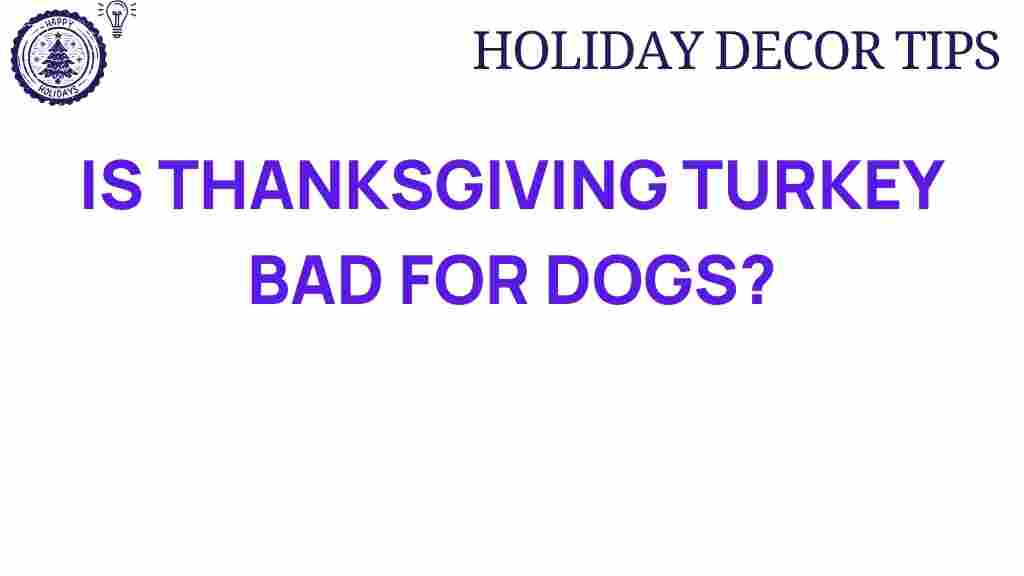The Thanksgiving Turkey Debate: Is It Safe for Your Dog?
As Thanksgiving approaches, homes across the country are filled with the aroma of roasted turkey, stuffing, and all the trimmings. While we enjoy this festive feast, many pet owners find themselves questioning whether the Thanksgiving turkey is safe for their beloved dogs. In this article, we will explore the pros and cons of sharing Thanksgiving turkey with your furry friend, and provide you with guidelines to ensure their safety this holiday season.
Understanding the Risks
Before diving into the specifics of Thanksgiving turkey, it’s essential to understand the potential risks associated with feeding it to your dog. Here are some concerns to keep in mind:
- Seasoning and Spices: Many Thanksgiving turkeys are seasoned with herbs and spices that can be harmful to dogs, such as garlic and onion.
- Fat Content: Turkey skin and dark meat can be high in fat, which may lead to digestive issues or pancreatitis in dogs.
- Bone Hazards: Cooked turkey bones can splinter and pose a choking hazard or cause internal injuries.
- Portion Control: Overfeeding your dog, even safe foods, can lead to obesity and related health issues.
If you’re keen on sharing some Thanksgiving turkey with your dog, it’s crucial to do so safely. Here’s a step-by-step guide on how to include your furry friend in the festivities:
Step 1: Choose the Right Turkey
Start by selecting a plain, unseasoned turkey. If you prepare your turkey at home, avoid adding any spices, especially garlic and onion. If you’re purchasing a pre-cooked turkey, check the ingredients to ensure it is free from harmful seasonings.
Step 2: Remove Skin and Bones
Once the turkey is cooked, remove the skin and any bones. The skin contains high-fat content, and the bones can be dangerous. Only offer your dog the lean, meat portion of the turkey.
Step 3: Serve in Moderation
When sharing Thanksgiving turkey, remember that moderation is key. Start with a small portion to see how your dog reacts. A few bites of turkey as a treat is much safer than a full serving.
Step 4: Monitor for Reactions
After feeding your dog a small amount of turkey, keep an eye on them for any adverse reactions. Signs of discomfort can include vomiting, diarrhea, or lethargy. If any of these symptoms occur, consult your veterinarian.
Alternative Thanksgiving Treats for Your Dog
If you want to include your dog in the Thanksgiving celebrations but are hesitant about turkey, there are plenty of safe alternatives:
- Sweet Potatoes: Cooked sweet potatoes are a nutritious option that many dogs enjoy.
- Green Beans: Plain, cooked green beans are low in calories and high in fiber.
- Carrots: Carrots are a crunchy snack that can help with dental health.
- Plain Pumpkin: Canned pumpkin (not the spiced pie filling) is great for digestion.
Troubleshooting Common Issues
Even when taking precautions, issues can arise. Here are some troubleshooting tips if you encounter problems:
Problem: Gastrointestinal Upset
If your dog experiences vomiting or diarrhea after eating turkey:
- Remove any remaining turkey from their diet.
- Offer them bland food, such as boiled rice or plain chicken, for a few days.
- Keep them hydrated and monitor their condition closely.
- If symptoms persist for more than 24 hours, consult your veterinarian.
Problem: Choking on Bones
If you suspect your dog has swallowed a bone:
- Stay calm and check their mouth for any visible bones.
- Do not induce vomiting unless instructed by a veterinarian.
- If your dog shows signs of distress (coughing, choking, difficulty breathing), seek emergency veterinary care immediately.
Conclusion: Enjoying Thanksgiving Safely
Thanksgiving turkey can be a delicious treat for your dog when prepared and served correctly. By choosing unseasoned turkey meat, removing skin and bones, and serving in moderation, you can safely share this holiday tradition with your furry friend. Always be cautious and monitor your dog for any adverse reactions, and consider offering safe alternatives to keep them included in the celebrations.
For more information on dog nutrition and safe treats, check out this comprehensive guide. Remember that your pet’s health and safety should always come first during the holiday festivities!
This article is in the category Themes and created by HolidayDecorTips Team
